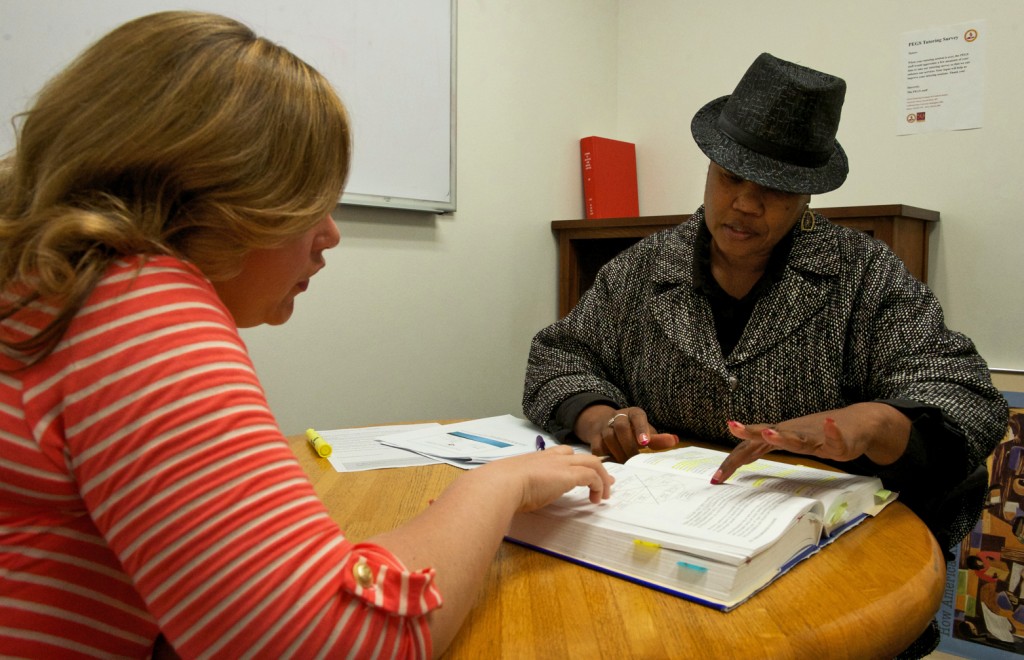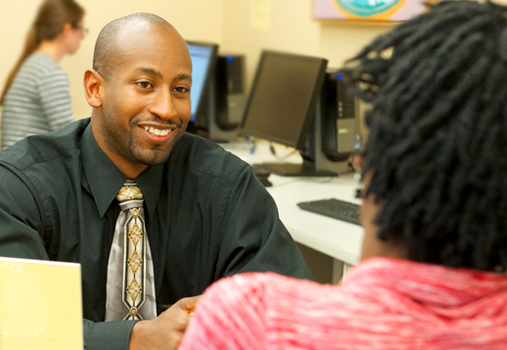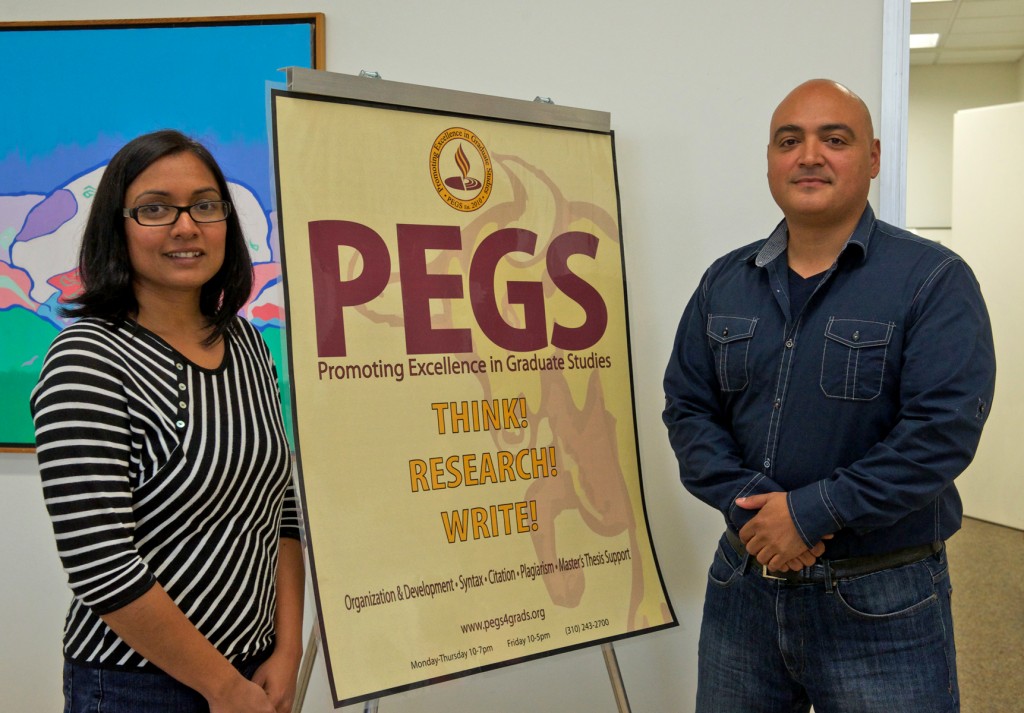Cleveland Goode made below-average grades as a University of Nebraska undergraduate student. But things improved dramatically years later in his graduate studies at California State University, Dominguez Hills with the help of the Promoting Excellence in Graduate Studies (PEGS) program. Now in the university’s marital family therapy master’s program, he has a 4.0 grade point average.
“My writing abilities and the central tools that were needed, I didn’t have them in undergrad. I was good at taking tests,” Goode revealed, adding that when he returned to school to pursue a graduate degree at age 51 he had some fears about the deficiencies in his academic writing skills. “[PEGS] was a really significant bridge that allowed me to go over the remedial skills that were missing, and give me the necessary skills that I should have. The tutors and Oscar [Ochoa, grant administrator for PEGS] not only helped me academically, but they helped me self-esteem wise to build my confidence.”

In its second year, PEGS, a program funded by a five-year $2.4 million Title-V Part B, Post-bachelorettes Hispanic Education Grant from the U.S. Department of Education, is focused on three areas: research writing skills, thesis projects, and tutoring and workshops. The workshops cover a wide array of topics including pre-writing invention strategies, how to write a literature review, performing well on in-class essay exams, proofreading for mechanics and style, and MLA and APA in-text citation, to name a few.
“We know that workshops are important to supplement students’ academic progress and their academic experience. At this point we have close to 20 different workshops,” said Leena Furtado, professor and chair of the Division of Graduate Education, who is also the director and principle investigator of PEGS.
PEGS offers master’s thesis support for students in smaller programs where faculty resources are limited, as well as travel scholarships for students who are interested in presenting their scholarship at conferences. Audio and visual recordings of PEGS workshops are available for high-impact programs and distance learning students, and there are plans to include remote workshops using video technology such as Skype. Additionally, students can publish their work on an electronic journal on the PEGS website as a learning experience for publishing in national journals.
“It’s a platform where students can see what publication and manuscript submission means,” said Furtado. “Graduate and doctoral students, along with faculty, are also gaining experience because they are reviewing the manuscripts.”

While the program is aimed at graduate students, PEGS accepts undergraduate students referred from faculty, the Toro Center, or the McNair Scholars program, as well as those who are doing graduate level work such as thesis writing or project writing and come in on their own. For example, undergraduate senior molecular biology major Kumar Tiger recently attended a workshop on writing for the sciences at the suggestion of his department advisor.
“I want to get every advantage I can. I’m going to try to publish an article in the next few months,” said Tiger. “When I start applying to grad school, I’m expected to write a paper.”
Alumnus Chris Potts (Class of ’05, B.A., cultural anthropology; ’08, M.A., English), who taught the workshop, said he is motivated to help students who are in–or are interested in attending–graduate programs.
“I had so many people take their time with me. If a student is willing, I feel obliged to attempt to recuperate some of the good will that was given to me and pass it on,” said Potts, who has completed his coursework in the English doctoral program at Claremont Graduate University, and who also teaches developmental writing courses through the English department at CSU Dominguez Hills.
Alaina Howard, a senior undergraduate majoring in interdisciplinary studies who has already taken two graduate level courses, said that by attending PEGS workshops she has learned how to format a scholarly journal in APA style, how to select scholarly articles, and how to distinguish primary and secondary sources, as well as accessing resources such as Purdue University Online Writing Lab (OWL).
“They teach how to pull language for journal review, analyzing how useful source information is to thesis argument, how to develop your argument, brainstorming, pre-writing, and organization. They don’t do proofreading, but they offer peer editing,” said Howard. “I’m looking forward to continue working with PEGS so that I cannot just complete a capstone, not just complete a portfolio, but actually produce research that is going to prompt me into a possibility for a Ph.D. program.”
Furtado pointed out that alumni such as Potts often return to the university where they were nurtured toward a master’s. “It’s theoretically sound; when you teach and share information, you get better at it. It is another level of cognitive imprint. Whether it’s for the GWC or for the master’s student,” she said.
Potts, who has worked for PEGS in various roles since its inception, designed a series of 11 writing and research workshops, which nearly 250 students have attended so far.
The program has five GWCs, two who are Ph.D. students; three others are graduate students. All GWCs are products of the English, teaching English as a second language (TESL) negotiation, or conflict resolution and peacebuilding masters programs at CSU Dominguez Hills. PEGS also has one library assistant who provides research support, and two master’s student ambassadors who focus on outreach, visiting classes to make brief presentations on the programs services.
“Ambassadors are the starting point for PEGS,” Furtado said.

PEGS grant administrator Oscar Ochoa, a graduate student in the interdisciplinary studies special major program, added that the ambassadors map out an outreach campaign before carrying it out, including developing promotional materials and communications tactics. He estimated PEGS ambassadors have reached about 400 students through 17 in-class presentations in 2012 alone. The presentation “Think like a graduate: the five habits of successful graduate students,” was presented to more than 150 students attending New Student Orientation over the summer.
During 2012 (as of Nov. 16), 43 workshops have been delivered to 907 students, and 758 tutorial sessions were offered, compared to 126 sessions in 2011.
CSU Dominguez Hills is one of the four CSU campuses to receive a Title-V Part B grant, along with Fullerton, Northridge and Channel Islands. Students and faculty from each of the 22 masters programs at CSU Dominguez Hills are eligible to receive support from the grant awarded to the university.
“Title-V Part B is the very first type of support for the master’s level student on our campus,” Furtado said, noting that several grants, including Title-V Part A, have been awarded to the university to support undergraduate programs such as Encounter to Excellence (ETE) and McNair Scholars.
The goal for PEGS during its third through fifth year is sustainability, institutionalization, and scalability.
“This third year is very critical we have to show learning needs and outcomes,” Furtado said.
For students such as Tiger, Howard and Goode, no convincing is necessary.
To learn more and to sign up for PEGS programs, visit www.pegs4grads.org.